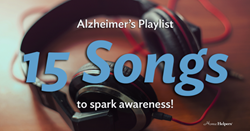Instead of the outsider discipline it once was considered, music therapy has come into its own in recent years in therapies for conditions ranging from mood disorders to stroke recovery.
While the evidence for the beneficial effects of music on the brain has been observed for many years, it hasn’t been until recent years that neurologists and other scientists have begun cracking the puzzle of exactly how it works.
Scientists tell us that scans of people’s brains change significantly when they are listening to music. In addition to the stimulation of regions responsible for processing sound, there can be a noticeable boost in activity in parts of the brain responsible for language, reasoning, even memory, and emotion.
Perhaps that’s why many of the clients we serve—especially our Alzheimer's and dementia care clients—enjoy music as part of their routines. It can be not only calming, but it seems there’s more and more evidence that it actually is therapeutic.
Here's one example: Hannah, an Exceptional Caregiver of the Year finalist from Brentwood, Tennessee, was observed jamming to Elvis Presley with her client. Watch the video below for the full story—I promise it will put a smile on your face!
Late last year, a study published at MIT found that there are even parts of the brain affected only by music.
A good book on the subject is Oliver Sacks’ Musicophilia. Sacks were the British-American neurologist that you might remember from his two most popular books Awakenings (made into a movie with Robin Williams and Robert DeNiro) and The Man Who Mistook His Wife for a Hat.
The book offers up case studies of several patients who had unexpected responses to music. Our Mary Simpson—another Exceptional Caregiver finalist, shown in the video below—experienced the dramatic effects of music on her senior care patient when coaxed her into playing her piano again.
In 2009, the popular PBS science program Nova profiled several of the case studies in Dr. Sacks’ book. Unfortunately, it’s not available for streaming but the transcript is available online and provides an excellent preview of the book.
We’d love to know how music affects you and or your loved ones. Does your family's dementia care routine benefit from the use of music or art?
Which songs are most impactful to your loved one? (For a list of ideas, check out our "Alzheimer's Playlist.")

Please share your stories with us on Facebook, and be sure to follow our “Music + Art Therapy” Pinterest board.